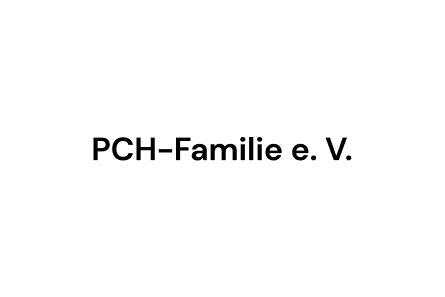PCH-Familie e. V.
Patient-Partnered Collaboration
Pontocerebellar hypoplasias (PCH) are a group of rare heterogeneous conditions. At least six types of PCH have been described and a few rare variants are now being identified. The disease is characterized by prenatal development of an abnormally small cerebellum and brain stem, which is usually associated with profound intellectual disability and delayed or absent psychomotor milestones.
Last updated 04/30/2025
Clinical
Disease Class
Genetic diseases
Neurological diseases
Body Systems
Digestive
Muscular / Skeletal
Nervous / Sensory
Respiratory
Organs
Brain
Known Genetic Link
Yes, one or more genes directly cause the condition
causative_genes
TSEN54 A307S
contributory_genes
None specified / unknown
Type of Inheritance
Autosomal recessive
Newborn Screening
No
Disease Mechanism(s)
Unknown
Age of Onset
Infancy (age 0-1)
Prebirth
Average Age at Diagnosis
Early childhood (age 1+-5)
Infancy (age 0-1)
Life Expectancy
Adolescence (12-17)
Affected Sex(es)
Female
Male
National Prevalence
51-100
Global Prevalence
101-1000
National Incidence
Less than 10
Global Incidence
Less than 10
Populations and/or ancestry with higher prevalence
Higher rates in people with North European ancestry (strong hypothesis of Dutch funder mutation)
Symptoms / Phenotypes
developmental delay
dysphagia
intellectual disability
microcephaly
movement disorders / ataxia / tremor
seizures / epilepsy
sleep disorders
vision problems
Biomarkers
None
Existing Therapies
None
Organizational & Research
Cell Lines
iPSCs
Cell Lines, Institution
Hertie Institute for Brain Research
Cell Lines, Involvement
Funded
Own
Cell Lines, share
All our cell lines are freely available
Disease Model
Organoids
Disease Model, Involvement
Consulted
Funded
Disease Model, share
Some of our disease models are freely available
Clinical Trial Role
Not involved
Biobank, Institution
HILDA Biobank Freiburg at Children`s University Hospital Freiburg
Biobank, Involvement
Consulted
Center of Excellence, Institution
None
Registry
No, we do not have a registry, but we plan to create one
Natural History Study
Yes, we have a natural history study that we created
Data Collected, Natural History Study
Genetic data
Imaging data
Medication usage
Patient-reported outcomes
Retrospective data
Platform, Natural History Study
REDCap
FDA Patient Listening Session
No
FDA Patient-Focused Drug Development (PFDD) Program
No
ICD Codes
We use an ICD-10 code capturing the family of diseases to which our disease belongs
Diagnostic Guidelines
No
Science Advisory Board Policies
Yes, willing to share SAB policies
Research Network Policies
Does not have a CRN
Research Roadmap
Yes we have a Research Roadmap, and will share policies
International Chapters
None
International Partners
None
